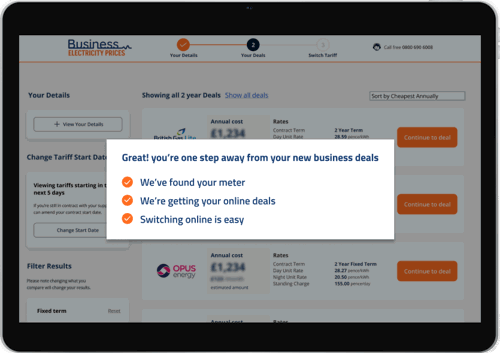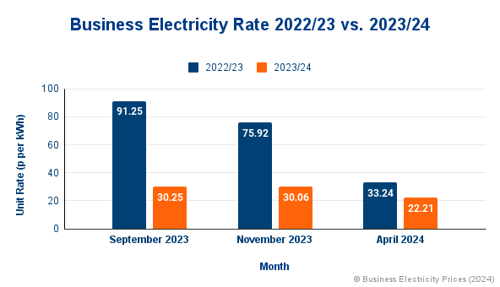Compare Business Electricity Prices
Compare and save on your business electricity rates in less than 30 seconds.

Compare Business Electricity Rates From UK Suppliers
Why Compare Business Electricity Prices?
You can compare business electricity rates online in just 30 seconds. We work with a trusted panel of suppliers to help UK companies find exclusive business electricity deals.
Business electricity comparison is just a few clicks away. Once we have a few details, choose the best tariff for your company. You can switch entirely online.
We'll aim to have you switched over to your new supplier within five working days.
Once your renewal window opens, we will get back in touch so you can avoid any expensive out-of-contract rates.
Table Of Contents
Understanding Commercial Electricity Rates
Commercial electricity rates are dependent on multiple factors, including location and consumption. This means the business electricity price per kWh available to you changes from day to day. Using our comparison engine is a great way to find the best business electricity rates.
Business Electricity Prices Per kWh 2024
| Business Size | Annual Usage | Unit Price per kWh | Daily Standing Charge | Estimated Annual Cost |
|---|---|---|---|---|
| Micro Business | Up to 5,000kWh | 25.2p | 73.1p | £895.75 |
| Small Business | 5,000-15,000kWh | 25.2p | 78p | £2,803.37 |
| Medium Business | 15,000-25,000kWh | 25.2p | 85.1p | £5,356.58 |
| Large Business | 25,000-50,000kWh | 26p | 112.5p | £10,164.12 |
| Very Large Businesses | 50,000+ kWh | 25.1p | 126.2p | £19,255.64 |
Data is correct as of 1 April 2024. Business electricity rates are based on a two-year contract taken from a UK average price of tariffs from our panel of suppliers. The table is the average business electricity unit rates per kWh, standing charge, and the annual cost based on yearly kWh usage banding for the mid-point of the usage band. Business electricity quotes may be impacted by meter type and business location.
How To Compare Business Electricity Rates
Unlike others in the market, businesses can switch suppliers online. Our tech-first approach helps busy businesses find time to save money on electricity. Comparing prices unique to your business takes just 30 seconds by using just your address with permission to look at your usage from your meter.
We work with a panel of trusted providers to ensure you’re getting a great deal. We’ll have you switched over within 5-working days. You can lock in your new business electricity rates up to 12 months before the contract end date. Your new contract will take effect once your current one ends.
In 30 seconds, you can compare business electricity prices and select the tariff that’s right for your company.
Business Electricity Rates By Supplier
Here are the latest business electricity supplier prices.
| Supplier | Electricity Rate (p/per kWh) |
Standing Charge | Monthly Price | Full Year Price |
|---|---|---|---|---|
| British Gas |
29.4p | 62p | £632.10 | £7,585.23 |
| Opus Energy | 22.9p | 195.9p | £537.60 | £6,451.21 |
| ScottishPower | 23p | 125p | £517.31 | £6,207.69 |
| EDF Energy | 24.9p | 50p | £534.85 | £6,418.21 |
| Smartest Energy | 26.1p | 63.1p | £562.39 | £6,748.66 |
| British Gas Lite | 29p | 42p | £617.63 | £7,411.51 |
Data correct as of April 2024. Full-year prices are based on a two-year business contract commencing on April 1 2024, with a 25,000 kWh annual usage. Prices reflect a live market and are subject to fluctuation.
Choosing Your Business Electricity Tariffs
Selecting the right type of business electricity tariff can have a big impact on your monthly bills.
So, it's important to think about your opening hours and which part of the day you're using the most electricity.
Here are the tariff types you can choose from.
-
Fixed-Rate Tariffs
The unit price you pay for electricity will be fixed for an agreed amount of time. Business owners who value budgeting and controlling their bills are attracted to this tariff.
-
Variable-Rate Tariffs
Variable-rate tariffs offer great flexibility. The unit price you pay for electricity will go up or down each month. This is a great fit for businesses that are open to more risk. This is a popular tariff in times of high electricity rates as many wait for prices to drop.
-
Renewable Tariffs
Renewable electricity tariffs offer a great option for businesses aiming to reduce their carbon footprint. Often there's not much difference in the unit price of renewable tariffs and some suppliers offer 100% renewable as standard.
-
Rollover Tariff
Businesses will be placed on a rollover tariff if a new deal has not been agreed. This is a legal contract for one year and the unit rate can be more expensive than previously paid.
-
Deemed Rate Tariffs
Deemed rate tariffs are for businesses moving into new premises and have not agreed to a deal. This only happens when a business electricity contract has never been in place at the property. These are some of the most expensive business electricity rates.
-
Flexible Tariffs
Large consumption business electricity users can purchase in bulk. Purchasing electricity at the beginning of the contract offers cheaper unit rates.
Simple Business Electricity Quotes
Enter a few details online
We just need some basic information like your postcode and contact details. It takes just 30 seconds to see live prices.
View live business electricity rates online
See live business electricity rates online from a trusted panel of UK suppliers.
Switch to your new supplier
We will handle the switching process once you have chosen your tariff and supplier. We will have you switched over within 5 working days.

Small Business Electricity Prices
In April 2024, a typical small business in the UK would pay £233.61 a month on average for their commercial electricity rates. This is based on a unit price of 25.2p and a daily standing charge of 78p.
A small business electric customer uses between 5,000-15,000kWh. Any less than this is considered a micro-business
Many owners decide to secure their rates with a fixed-rate tariff for 2 to 3 years for budgeting and predictable billing.
The truth is nobody knows with absolute certainty if wholesale electricity prices will go up or down. We can make predictions, but many prefer the security of knowing what they will pay.
Large Commercial Electricity Rates
In April 2024, a typical larger business in the UK would pay £847.01 a month on average for their commercial electricity rates. This is based on a unit price of 26p and a daily standing charge of 112.5p.
A large business electric customer uses between 25,000-50,000kWh annually. Any larger usage customers would need a more bespoke business electricity quote.
We will help you build a bespoke tariff. Incorporating energy management systems, and ISO 50001 requirements; right through to meter installation. Securing great commercial electricity rates includes buying from wholesale suppliers and collective buying schemes.
Energy Management Software
Energy Management Software solutions deliver the ability to monitor and analyse electricity usage.
If you have a half-hourly or smart meter installed on your premises, then you can control your data using a range of integrated software solutions. Energy management allows your company to track actual usage versus averages.
In 30 seconds, you can compare business electricity prices and select the tariff that’s right for your company.
What Are The Cheapest Commercial Electricity Rates?
We’re all searching for cheaper business electricity prices since seeing prices skyrocket just a few short years ago.
We've seen business electricity prices firmly stay at a similar price for a few months now. Electricity rates are impacted by demand, wholesale prices and multiple other factors. This means business electricity rates can go up or down on any given day. Many companies are choosing to grab a fixed rate deal for security and the ability to predictably budget.
Here's a graph that shows how electricity prices have changed since last year.

What Happens After I Have My Business Electricity Quotes?
If you provide us with permission to look up your usage via your meter number we’ll have everything we need to start the switching process once you have chosen a deal and agreed to switch.
We’ll take it from there. Before that, you may want to review your options and this could include comparing your business electricity quote to your renewal letter.
If you’d like to terminate your business’ electricity contract, there are a few steps that you’ll need to take. These include:
- Keep an eye out for your renewal letter
If your company is considered a micro business, your electricity supplier must send you a renewal letter at least three months before your renewal date. This document will include details about your current tariff, its renewal date and your options for cancellation or continuing with your existing supplier.
If your business is not considered a microbusiness, the onus is on you to remember your contract’s renewal date and organise a termination or supplier switch.
- Send a termination letter to your supplier
Sending a termination letter to your supplier is the most effective way to cancel your electricity contract. You can do this via email or post. Just ensure that you set delivery receipt alerts if you choose to send an email, and get recorded delivery if you send the letter by post.
Additionally, most suppliers require you to send your termination notice at least 30 days before your contract’s end date. Any later than this could lead to you being placed on an expensive rollover contract.
If you’d like to save yourself the hassle of sending a termination letter, you could switch electricity suppliers with Business Electricity Prices. If you provide enough notice, we’ll terminate your current electricity contract and manage your switch to a new supplier.

If you opt to terminate your contract yourself, here are some of the details you should include in your termination letter:
- Your meter number
- Your electricity account number
- A signature from an individual known to the supplier in association with your business
- The document should have your business’ letterhead, or the email should come from a business email address
In our FAQ section, you can find a letter template to terminate your business electricity contract.
In 30 seconds, you can compare business electricity prices and select the tariff that’s right for your company.
Business Electricity Rates FAQs
-
Can I Switch To A No Standing Charge Tariff?
No standing charge tariffs have not been available for a few years. However, they may come back in the future.
Many providers will not offer an electricity tariff with a zero standing charge with a competitive kWh cost putting many businesses off.
No standing charge tariffs can benefit businesses which operate seasonally and those that open just a few days a week.
-
Is Business Electricity Cheaper Than Domestic?
Business electricity prices are cheaper than domestic. This is because providers usually only buy your supply of electricity once the new contract has been agreed upon.
This means that if the company agrees to a 4-year contract, the supplier will purchase the electricity to cover the full contracted period.
-
How Can Energy Management Systems Help My Business?
Companies can lower expenses by reducing consumption and introducing energy-efficient products. Innovations together with software help manage usage and maintain visibility reporting.
The Carbon Trust estimates that investing in efficiency annual savings of between 10% and 20% are achievable throughout the company.
-
What Does ‘kWh’ Mean?
A kilowatt hour (kWh) is the name given to a unit of energy and is the standard unit. This is a metric used to calculate usage and cost.
This is calculated on a price per kWh basis. 1 kWh would approximately equate to using a desktop computer for 3 hours or boiling a kettle 10 times.
-
What Is The VAT Rate On Business Electricity?
The standard VAT charge on business electricity is 20%. Some companies may be eligible for a discount to 5% (non-profits).
Our VAT on Business Electricity guide explains this in more detail.
-
Are Business Electricity Rates Cheaper At Night?
You can get cheaper business electricity rates at night if you have a multi-rate meter.
-
How Long Does It Take To Switch Business Electricity?
We’ll aim to switch you to your new supplier within 5 working days.
-
What Is Classed As A Large Business?
You're considered a large business if you consume more than 55,000 kWh of electricity per year.
-
What Is A Meter Point Administration Number (MPAN) Used For?
MPAN is short for Meter Point Administration Number. This is a unique identifier that is assigned to each electric meter. These numbers are 21 digits long and can be found on your business electricity bill or on your meter.
-
What Is The Difference Between a Small Business And A Micro Business?
A micro-business is defined by the EU as having less than ten employees or a turnover of less than £1.8 million. This definition would cover most of the 4.4 million businesses operating in the UK.
-
How To Reduce Small Business Electricity Bills?
Reducing consumption, switching suppliers and direct debit discounts are the easiest ways to save money on business electricity.
A great way to reduce the cost of business electricity is to conduct a business electricity audit.
-
How To Set Up Business Electricity for The First Time?
There are four main steps to setting up your business’ electricity. These are:
- Locate your meters and take a reading – This is the first task you should complete when you move into your new business premises. Take an electricity meter reading will measure the energy you’ve used since entering the property and help ensure that your future bills are accurate.
- Find out your current supplier – Once you’ve recorded the meter readings, you’ll need to provide them to the building’s current energy supplier. You can find out who this is by enquiring with the property seller or the previous tenants. Alternatively, you can use the Meter Point Administration’s online tool to find out your gas supplier and use the Energy Networks Association tool to find out who supplies your electricity. These services will also be able to inform you of your MPAN and MPRN.
- Choose a tariff – Your business electricity needs may be different to your building’s previous owners, so you should consider the different types of tariffs available. For example, you can choose between fixed-rate contracts, variable-rate contracts, multi-site contracts, and Economy 7 and Economy 10-meter tariffs.
- Compare deals – Finally, once you have an idea of the type of contracts your business requires, you can compare business electricity tariffs to find the best deal.
-
What Costs Make Up Business Electricity Prices?
Your business electricity bill includes the following:
- Unit rate (charged in pence per kWh)
- Daily standing charge (charge at a rate of pence per day)
- VAT at 20%
- Climate Change Levy (CCL)
The unit rate is used to calculate how much electricity has been used. A daily standing charge will be added to the annual total. For example, a standing charge of 50p would be multiplied by 365 days.
Businesses will pay the standing charge regardless of how much energy they have used that day.
VAT will be applied to the business electricity bill at a standard rate of 20%. Non-profit businesses may be eligible for a discounted VAT rate.
Businesses will also be charged a Climate Change Levy (CCL). This is a 'green tax' charged at 0.775p for electricity for the period April 2023 to March 31st 2024.
-
How To Get The Best Electricity Quotes For My Business?
To get the best electricity quotes for your business, start by understanding your energy needs. Look at different energy suppliers, and compare rates, contract terms, and customer reviews. Choose a reliable supplier with favourable contract terms that align with your business goals.
Check unit rates and additional charges to find the most cost-effective option. Consider renewable energy choices if sustainability matters to your business. You can also get government support if your sustainability goals align with grant guidelines.
You need to prioritise good customer service for quick issue resolution. Negotiate terms with suppliers and seek advice from our Business Electricity Prices expert team to navigate the process efficiently.
Following these steps will help you secure the best electricity quotes to suit your business needs.
-
What Should I Include In My Contract Termination Letter?
Below is an example of a termination letter template:
To Whom It May Concern,
To: Your electricity supplier’s address
From: Your name, company name and registered business addressPlease accept this letter as formal notice of the termination of the electricity contract [contract number]. This notice is for meter numbers MPAN/ MPRN, registered at the address quoted at the top of this document. This termination notice is set out per the terms and conditions of the contract and is to take effect as of the contract end date.
Please confirm in writing you have received this notice of termination.
Yours faithfully,
Your name.
Your role.
Your Company Name.Your Signature.
-
How Much VAT Is Paid On Commercial Electricity Rates?
A standard VAT rate of 20% is applied to business energy. Some businesses may be eligible for a VAT reduction. You can read more about VAT on electricity bills here.
Compare Business Electricity Rates
See the best business electricity deals currently available!
Switch in 3 simple steps
-
1
Answer a few simple questions so our quoting engine can identify your current supplier and spend
-
2
Compare the best tariffs in the market with our online comparison and exclusive online prices
-
3
Choose your new tariff and start saving







